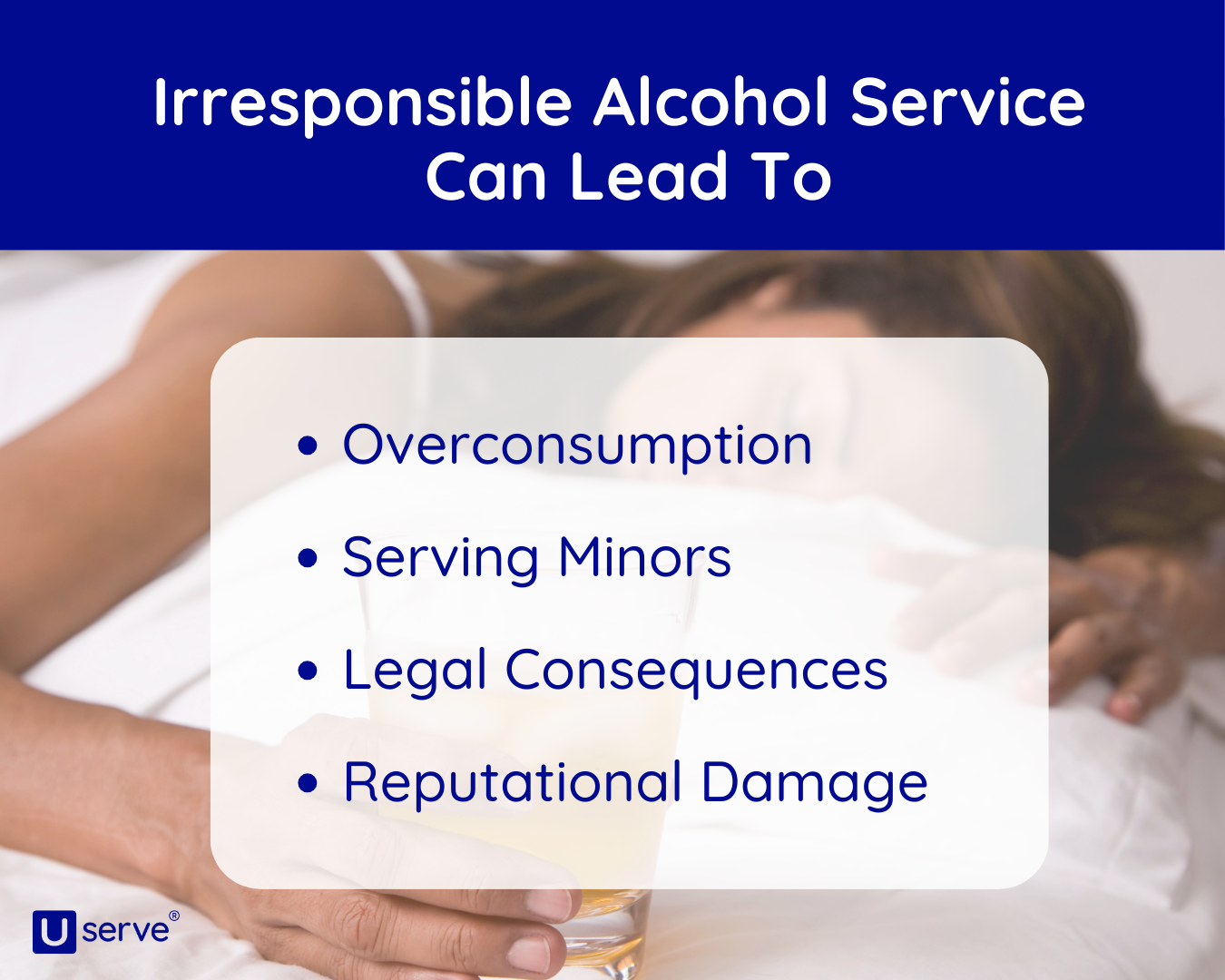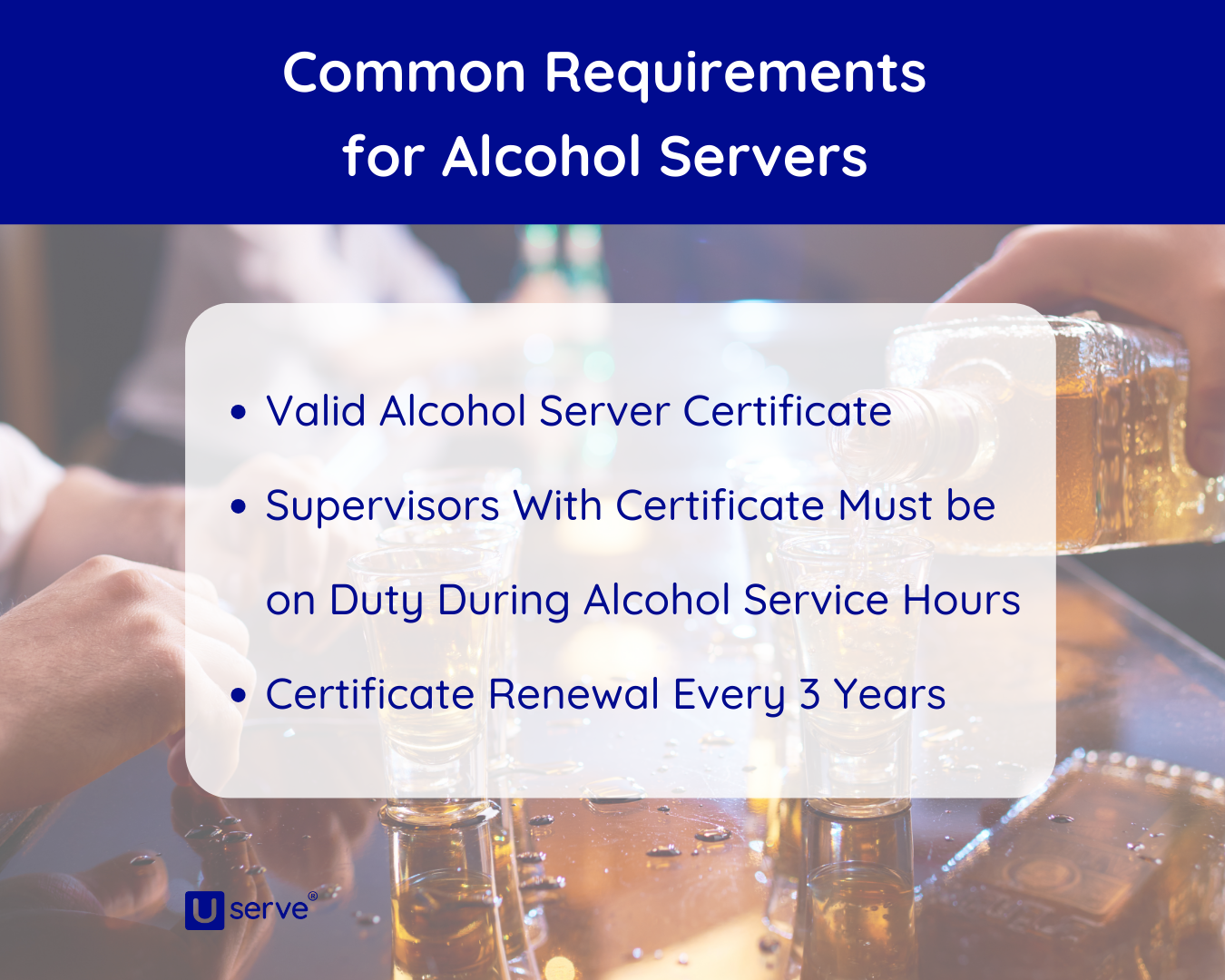Alcohol is best enjoyed in moderation, but not everyone has the self-control to avoid intoxication. If Alcohol Servers don't take control of the situation, excessive alcohol consumption can occur, potentially leading to dangerous situations for customers and the wider public.
Alcohol Server Training is essential for maintaining safe environments and meeting regulatory standards.
Data provided by the National Institute on Alcohol Abuse and Alcoholism (NIAAA), indicates that as many as 5 million Americans are admitted to hospital each year in relation to alcohol-related incidents, with more than 140,000 fatalities recorded over the same period.
These alarming statistics highlight the importance of responsible alcohol service and ensuring your alcohol safety training is up-to-date. Being an alcohol server involves more than just pouring drinks; it also requires implementing safety measures to protect customers, fulfill legal obligations and maintain a good business reputation.
This blog will discuss why these safety measures matter, with a specific focus on how to avoid overserving intoxicated patrons.
Why Alcohol Server Training Matters for Responsible Service
As an Alcohol Server, you have a responsibility to protect your customers, your community and yourself from the negative effects of alcohol consumption. Irresponsible alcohol service can lead to many issues, including:
- Overconsumption: Serving too much alcohol to an individual can lead to intoxication, which may result in accidents, health issues or even violence.
- Serving Minors: Not only is selling alcohol to minors illegal, but it can also cause serious, long-term health effects, and in some cases, become life-threatening.
- Legal Consequences: Violating alcohol laws and regulations can have severe legal ramifications, including fines, suspension of licenses and even imprisonment.
- Reputational Damage: For businesses in the hospitality industry, irresponsible alcohol service can tarnish your brand's reputation, leading to loss of customers and revenue.
How Alcohol Impacts the Body
Grasping how alcohol affects the human body is essential for ensuring the safe service of alcoholic beverages to customers. Therefore it is important that you develop a solid understanding of both the physiological and psychological effects of alcohol consumption.
For example, accurately estimating a customer’s Blood Alcohol Concentration (BAC) and recognizing signs of intoxication can greatly reduce the risk of overserving, thereby helping to prevent alcohol-related incidents.
Userve Alcohol Server Training can assist by educating you on the following:
- How alcohol passes through the body
- How the body processes alcohol
- How alcohol in the bloodstream is measured
- How to estimate a person’s Blood Alcohol Concentration (BAC) using a BAC chart
- Factors that impact BAC
- Standard servings of alcohol
- Common myths about sobering up
The implications of overserving are even more serious in the context of underage drinkers who are typically more susceptible to the adverse effects of alcohol. The Centers for Disease Control and Prevention (CDC) reports that each year, excessive drinking causes the deaths of approximately 4,000 people under the age of 21 in the United States.
Serving alcohol to underage or intoxicated customers is both illegal and unsafe. The Userve Alcohol Serve Course equips you with the tools and techniques needed to prevent such scenarios, including strategies for identifying minors, checking IDs and refusing service.
How Alcohol Impacts Society
Most of the time, alcohol is used to enhance social situations, reduce stress or celebrate special occasions. However, alcohol consumption can quickly become irresponsible, leading to serious consequences and even life-threatening situations.
Driving under the influence of alcohol is an all-too-common example of this. According to the National Highway Traffic Safety Administration (NHTSA), an average of 37 people die in drunk-driving incidents every day—that's one life lost every 39 minutes.
Understanding the social impacts of alcohol forms the basis of responsible service. It is crucial that you are aware of how your individual actions can positively or negatively influence the drinking behavior of patrons in your establishment. Doing so will ensure that you maintain a safe, enjoyable environment for your customers to appreciate while also safeguarding the wider community.
Refusing Service to Intoxicated Individuals
Dealing with intoxicated customers and diffusing tense situations is a delicate skill that helps ensure a safe and enjoyable experience for all. The Userve Alcohol Server Training Program empowers you to develop robust procedures for refusing service to intoxicated customers in a professional manner.
Alcohol Server Training: Understanding Alcohol Service Laws and Regulations
Each state has the right to regulate the sale and service of alcoholic beverages. Userve Alcohol Server Training provides essential information to help you better understand and comply with legal requirements in your specific region. To achieve this, the course provides education on the below aspects of regional requirements:
- Laws and regulations specific to alcohol service
- The role of the liquor authority
- The role of local law enforcement agencies
- The role of your employer
- Different types of liabilities related to alcohol service
Certification Requirements
Different states will have different requirements when it comes to Alcohol Server Certification. Here are some of the most common ones:
- Alcohol Servers employed at a licensed business must have a valid Alcohol Server Certificate.
- A supervisor with a valid Alcohol Server Certificate must be on duty during alcohol service hours.
- Alcohol Servers must renew their certificate every 3 years.
You must be aware of the alcohol training requirements for the state in which you work. Failing to comply with these requirements can result in administrative penalties and disciplinary action.
Where necessary, Userve Alcohol Server Training has been aligned to state-specific regulations to ensure participants obtain the appropriate certification. Here are some examples of state-approved training courses:
California Responsible Beverage Service (RBS) Certification Program
Userve’s RBS Course is approved by California’s Department of Alcoholic Beverage Control (ABC).
In order to meet the requirements of CA Assembly Bill 1221, all on-premises Alcohol Servers and their managers are required to undergo RBS training and pass the RBS Certification exam to legally serve alcohol. Certification is valid for three years.
Illinois BASSET Certification Program
Designed for both on-premises and off-premises alcohol beverage servers and their managers, Userve’s BASSET Training provides a simple route to achieving state-required BASSET Certification.
Michigan Alcohol Server/Seller Certification
Userve’s Michigan Alcohol Server/Seller Training is approved by the Michigan Liquor Control Commission (MLCC). Participants can also complete their final exam online with Userve to obtain their Michigan Alcohol Server/Seller Certification.
Userve Alcohol Server Training
Userve Alcohol Server Training covers an extensive range of topics designed to equip you with the knowledge and skills for serving alcohol in a safe and responsible manner. The course is split into four sections, covering the key components of responsible alcohol service:
- Social Impacts of Alcohol
- Impacts of Alcohol on the Body
- Laws and Regulations Related to Alcohol Service
- Prevention of Service to Minors and Intoxicated Customers
- After successfully completing the course and passing the accompanying certification exam you will be in a better position to avoid overserving, ensure customer safety and meet your legal obligations as a certified Alcohol Server.
Find the relevant Alcohol Server Training for your state and enroll online with Userve. Need help choosing the right course for you? Get in touch with our team, they are ready to assist you.

